If you’re reading this it’s likely because you’re going to Greece or it’s on your bucket list. Either way, I’m so excited for you because there’s something special about the country known for olives, ouzo, and sea views that are even prettier than they look in The Sisterhood of the Traveling Pants. But beyond the beautiful scenery and licorice-like alcohol, what continues to humble me most about Greece is the language.
For one, Greek has an extremely rich vocabulary, clocking in about five million words and 70 million word types. Greek City Times reports that while only 600,000 Greek words are used today, that’s still about 3.5 times the English vocabulary. Plus, reports show that more than 40,000 English words are derived from Greek, which is about a quarter of the words in the English dictionary.
It’s no question that Greek is an influential and complex language. Some studies even deem it to be one of the more difficult languages to pick up for English speakers, up there with Russian and Finnish.
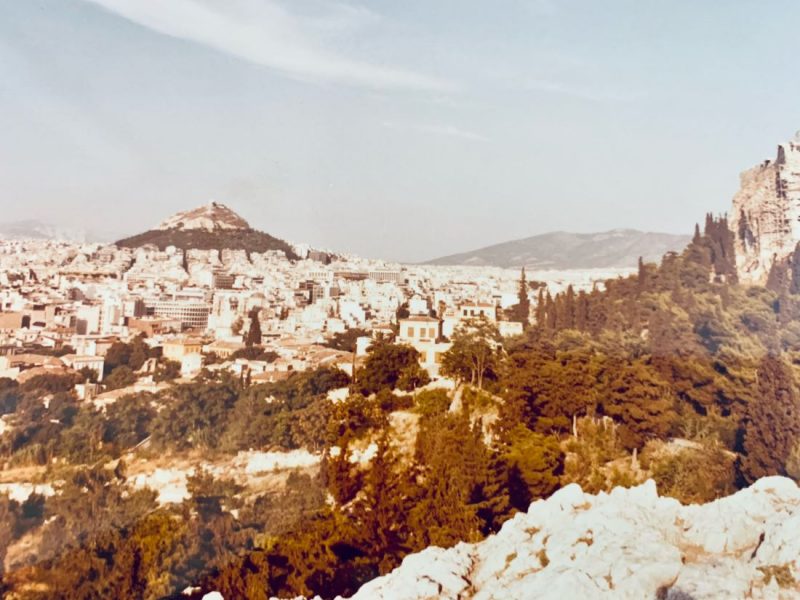
Although I’m a Greek American, until recently I only knew a few Greek words — most of which were names of (delicious) food. So I’ll admit that taking virtual Greek lessons has made me realize just how challenging learning the language would be. FYI: All those fraternity and sorority names don’t do anyone any favors when it comes to pronunciation!
However, even though it’s hard to get the rolling “r” right and remember the Greek “p” sounds like the English “r,” there’s a good chance that — no matter how you say a Greek word — the person you’re interacting with in Greece will be appreciative of the effort.
At least in my experience as a tourist, I’ve found most Greeks to be very receptive when I’ve attempted to speak the language. The worst response has been a polite smile. The best? An invitation to a home-cooked meal in Paros.
In the words of my Modern Greek teacher, “you will likely get a response back in English, but it’s still a nice thing.”

All that said, you probably won’t need to speak Greek at all when visiting Greece. Many people speak English — especially if you’re visiting tourist-driven islands like Santorini, Mykonos, and Rhodes.
But if you, like me, find there’s value in learning a few words of the local language to enrich your traveling experience and gain a deeper cultural understanding of where you are, I hope this list of Greek phrases and words helps you in your everyday interactions. Yamas!
Everyday Greek Greetings for Travelers & Tourists

1. Yeia sou! “Yah-soo”: Hello
Whether you’re visiting Greece for a weekend or a month, you’ll hear a lot of Yeia sou, Yeia sas, and Ya. They’re very similar, but slightly different.
Here’s a brief breakdown:
- Yeia sou: Hello (casual). This is used in informal settings or among friends. Fun fact: It can also be used to say “bless you” after someone sneezes, along with Yitses.
- Yeia sas: Hello (formal). You may hear this at a nicer restaurant from your waiter or at a hotel. You could also use this when addressing a group of people, an acquaintance, or someone who is older than you.
- Ya: Hey (very casual). This is a shorter version of Yeia sou that you’ll likely hear tossed around a lot in casual settings.
2. Kalimera “Kah-lee-meh-rah”: Good Morning
One of my absolute favorite things about being in Greece is that it’s socially acceptable to say kalimera (“good morning”) until 5p.m. So if you sleep in until noon and order your first frappe at 1 p.m., you can still say kalimera to the waiter without feeling strange.
It’s just another reason to love Greece, where mornings blur into afternoons so much that they’re one in the same, at least from a greetings standpoint.
That said, make no mistake, the “lazy Greek” stereotype is far from an accurate portrait of reality. Here are just a few of the many ambitious Greek women doing remarkable and inspiring work:
- Christina Flampouri: the only Greek woman to ascend all 7 summits and the first Greek woman to summit Everest.
- Andria Zafirakou: author of Those Who Can, Teach and winner of the 2018 Global Teacher Prize for being the best educator in the entire world.
- Noella Coursaris Musunka: founder of nonprofit Malaika, who is on a mission to empower girls and their communities through education.
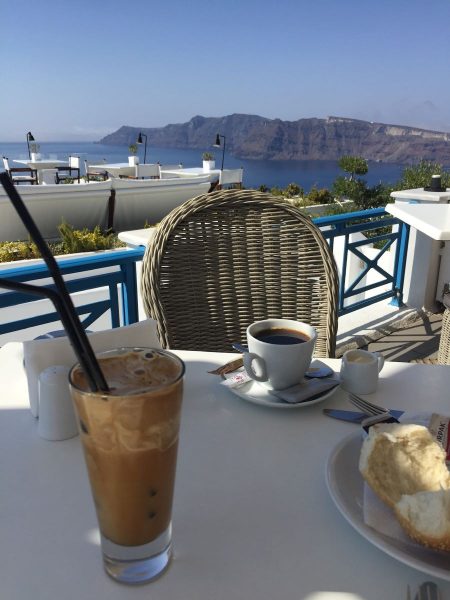
3. Kalispera “Kah-lee-speh-rah”: Good Evening
Once it’s 5 p.m., it’s time to switch the greeting to kalispera or “good evening.” It’s essentially another way to say “hello” after 5 p.m.
4. Kalinikta “Kah-lee-nee-khtah”: Good Night
Kalinikta is used to say “bye” in the evenings when you’re going home or leaving a restaurant. Keep in mind that it’s routine to eat dinner around 9 to 10 p.m. in Greece. So you may be saying your goodbyes later than you’re used to!
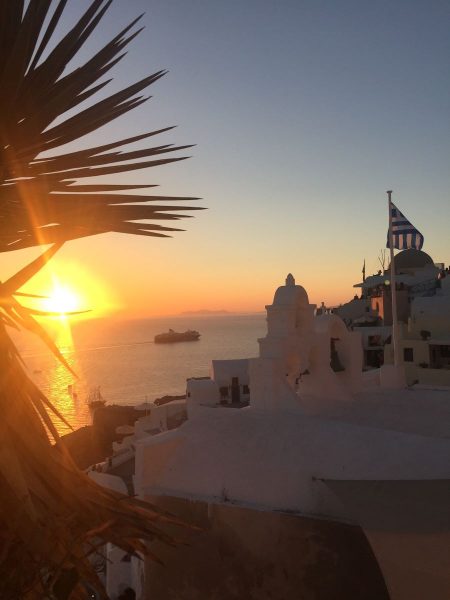
5. Andio “Ahn-dee-oh”: Goodbye
While Kalinikta is used to say bye at night, andio (note, the “n” is very slight) can be used any time, morning or evening.
Everyday Greek Words To Be A Polite Tourist
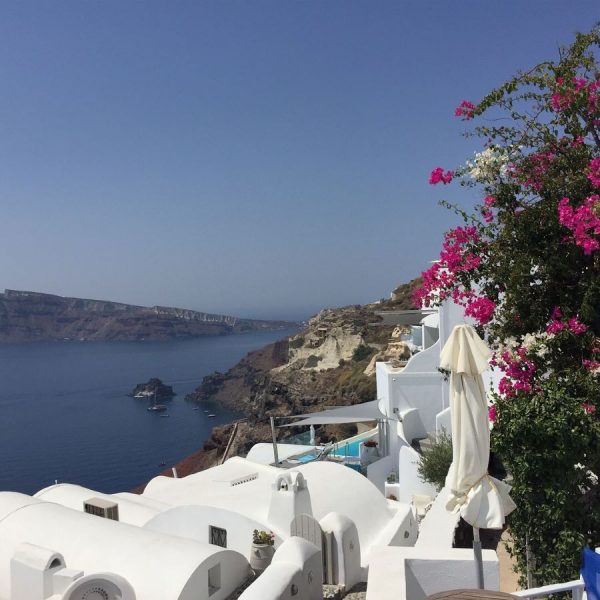
6. Efharisto “Ehf-khah-ree-stoh”: Thank you
The first Greek word I ever learned was efharisto. It took me about fifty tries to get the rolling “r” sound right (it’s almost a light “d”) and another fifty to figure out the inflection. But if you remember only one word from this list, I hope it’s this one!
I found that simply adding efharisto at the end of a nice exchange with a local made me feel more of a connection to the person I was interacting with.
7. Parakalo “Pah-rah-kah-loh”: Please and You’re Welcome
This is another good one to remember even if you’re only visiting Greece for a short time. It has a double meaning, as it’s used to say “you’re welcome” and “please.” I found it mostly useful when ordering at a restaurant, such as “spanakopita, parakalo” or “a glass of Retsina, parakalo.”
8. Signomi “See-gnoh-mee”: Excuse me and/or Sorry
Signomi is useful if you’re trying to get through a busy area or want to apologize. Note: the “g” sound is very soft.
Greek Words To Know for Fun
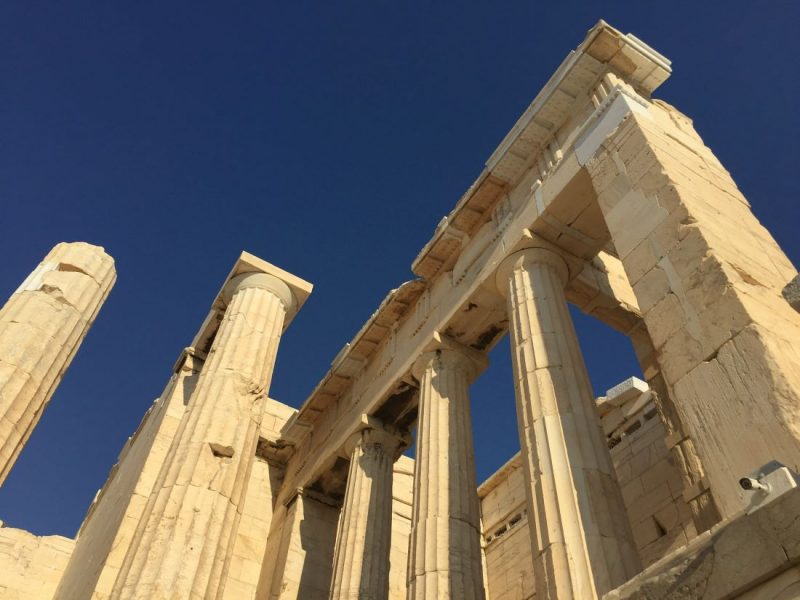
9. Opa! “Oh-pa”: Oops!
If Opa! immediately makes you think of throwing dishes on the ground, you’re on the right track. “Opa” is another way to say “oops!” It’s a common expression after making a mistake. But it can also be used to express shock, surprise, or enthusiasm.
10. Yamas “Yah-mahs”: To Our Health (used like “cheers”)
When you’re clinking glasses of wine, beer, ouzo, or any other alcohol, you can say Yamas which means “to our health.” Something to note, it’s not typical for Greeks to toast with coffee. Some say it can even bring bad luck.

11. Fili mou “Fee-lee moo”: My Friend
This is a term of endearment often used to show kindness and friendly affection. You may hear it if you have a nice exchange with a waiter or a local eating next to you at a restaurant. When I traveled to Greece as a child I also heard “koukla mou” quite a lot which means “my doll.”
12. Kefi “keh-fee”: Fun or Joy
Truthfully, any definition I write here won’t do this word justice. But I’ll give it a go! Kefi, which literally translates into “fun” can be used to describe moments of joy, whether it’s dancing at a party or enjoying a nice meal with loved ones. In a broader sense, it’s about being present and embracing the moment as it is with a warm, open heart. If you hear this word, it’s definitely a reason to smile.
13. Siga Siga “see-gah, see-gah”: Slowly, Slowly
I had to add this to the list because it’s one of my all time favorite phrases. It’s used to tell someone to slow down, literally. For example, my Yiayia used to say “siga siga” when I got a little ahead of myself when layering filo sheets for spanakopita and I heard it once at an airport in Athens when I was in a bit of a tizzy looking for my passport. But I repeat this word often as a reminder to nourish a sense of slowness in life, whether that’s taking a breath before adding to a conversation or walking the long way home. Siga siga.
Other Greek Words & Phrases That Come In Handy when Traveling

14. Nai “Neh”: Yes
Funnily enough, the Greek “yes” sounds extremely similar to the English “nah.” This caused me a bit of confusion on my early trips, particularly with taxi drivers who I thought were rejecting me and my mom.
15. Oxi “Oh-khee”: No
And if you want to be polite, you can say, “oxi, efharisto” or “no, thank you.”
16. Endaxi “ehn-dah-ksee”: It’s OK
Endaxi can be used for everything from agreeing to a price to saying “it’s all good” if you get into a misunderstanding at a hotel or cafe. I think of it a little like the expression “no worries.”
17. Ela “eh-la”: Come or Come On
This is another word you’ll probably hear a lot when you walk around. And if you spend any time calling locals, you’ll notice it’s a common way for Greeks to answer the phone, usually if someone they know is on the other end.
18. Me lene “Meh-leh-neh”: My name is ____.
If you want to ask someone their name, you’d say “pos se lene” (pohs seh leh-neh).
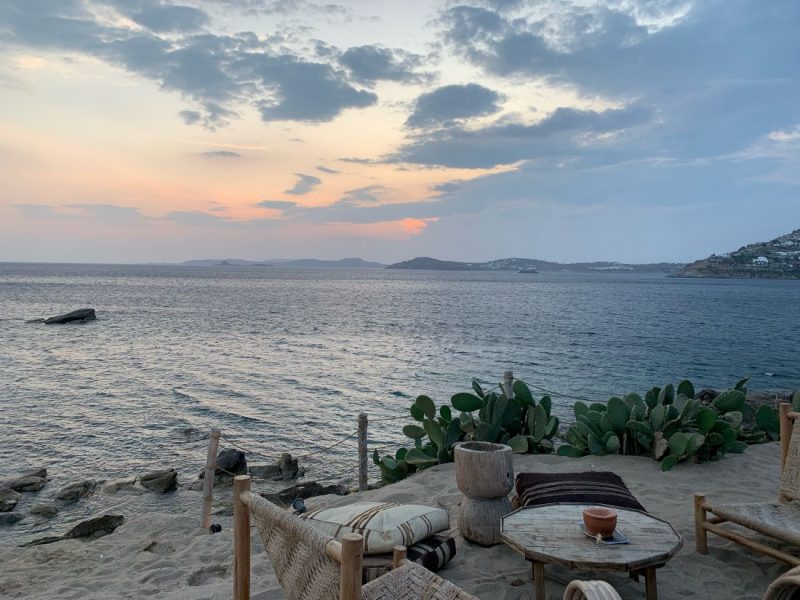
Other things for you to consider: in my opinion, ordering coffee to go isn’t nearly as fun as drinking it at a local cafe, simply sitting in a car will likely be an adventure, and punctuality isn’t always a priority in Greece (to put it generously). I hope you enjoy every moment of your trip — ferry delays and all!
For inspiration on what islands to visit, check out this post by Wanderful Founder, Beth Santos: Patmos: The Greek Islands’ Best Secret.














































